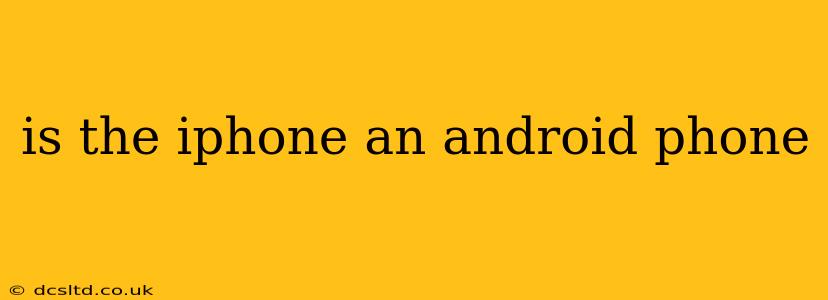No, the iPhone is not an Android phone. This is a fundamental distinction in the mobile phone world, and understanding the difference is crucial for anyone navigating the smartphone market. The iPhone and Android phones operate on entirely different operating systems (OS), developed by separate companies and boasting distinct features and ecosystems.
Let's delve deeper into what sets these two giants apart:
What is an Android Phone?
Android is an open-source operating system developed by Google. This means that various manufacturers (like Samsung, Google, OnePlus, etc.) can use Android as the foundation for their phones, customizing it with their own interfaces and applications. This leads to a wide variety of Android devices, each with its own unique look and feel, but all running on the core Android OS.
What is an iPhone?
The iPhone, on the other hand, uses iOS, a proprietary operating system developed and exclusively used by Apple. This means only Apple designs and manufactures iPhones, resulting in a highly consistent user experience across all models. While iOS offers customization options, the level of control is significantly less than what Android provides.
Key Differences Between iOS and Android
Here's a table summarizing some of the most significant differences:
| Feature | iOS (iPhone) | Android |
|---|---|---|
| Operating System | Proprietary, developed by Apple | Open-source, developed by Google |
| Manufacturer | Apple only | Multiple manufacturers (Samsung, Google, etc.) |
| Customization | Limited | Highly customizable |
| App Store | App Store (curated by Apple) | Google Play Store (less curated) |
| Ecosystem | Tightly integrated Apple ecosystem | More fragmented ecosystem |
What are the Common Misconceptions?
The confusion might arise from the fact that both iPhones and Android phones are smartphones, offering similar core functionalities like calling, texting, internet browsing, and app usage. However, the underlying software and the entire user experience are vastly different.
What are the benefits of each OS?
This is largely a matter of personal preference. Android offers greater customization and flexibility, while iOS is known for its simplicity, user-friendliness, and a tightly controlled ecosystem which often results in better app performance and security.
How can I tell if a phone is an iPhone or an Android?
Identifying the difference is easy. Look for the Apple logo on the front or back of the device – that's an iPhone. If there's no Apple logo and the operating system is clearly not iOS (the home screen, app icons, and overall interface will differ substantially), it's an Android phone.
Hopefully, this clarifies the distinction between iPhones and Android phones. They are two distinct platforms offering unique strengths and catering to different user preferences. Choosing between them depends entirely on individual needs and priorities.
